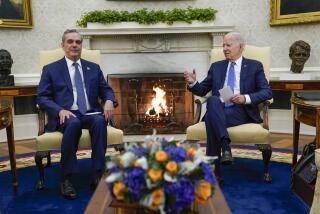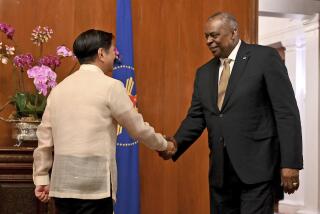Reagan Praises Aquino, Calls for Investments
- Share via
WASHINGTON — President Reagan on Wednesday voiced strong support and personal praise for Philippine President Corazon Aquino and declared, “I’m bullish on the Philippines.”
After his first meeting with Aquino, which lasted three times longer than the scheduled 15 minutes, Reagan also called on businessmen to invest heavily in a country that he said presents “an incredible opportunity.”
For the record:
12:00 a.m. Sept. 19, 1986 For the Record
Los Angeles Times Friday September 19, 1986 Home Edition Part 1 Page 2 Column 1 Foreign Desk 2 inches; 55 words Type of Material: Correction
Because of an editing error, The Times mistakenly reported Thursday that the Philippines and the United States had signed an agreement transferring $150 million in U.S. Agency for International Development funds to the Philippines. In fact, no AID funds were involved. The agreement called for the transfer of $100 million in direct U.S. budgetary assistance and $50 million in military aid.
Reagan praised Aquino’s “personal bravery” and “courage,” and both Reagan and Aquino declared that they have forged a new, personal friendship that will boost Aquino’s efforts to rebuild her nation’s devastated economy.
“For my part, the most important aspect has been to meet each other,” Aquino told reporters on the White House lawn, where, four years ago, Reagan had stood beside the man Aquino helped drive from office, then-President Ferdinand E. Marcos.
‘A Good Beginning’
Aquino added that the Wednesday meeting and luncheon were “a good beginning” in “an ever-growing friendship.” Reagan said that Aquino’s “commitment to democracy” and free enterprise has “inspired the world.”
The only previous contact between Aquino and Reagan was a 10-minute telephone conversation shortly after Aquino assumed office on Feb. 25.
In advance, Aquino had called the meeting with Reagan the most important part of her eight-day U.S. visit and said she expected no additional U.S. government aid to come out of the meeting.
But Reagan did authorize what one State Department official later called “an important token” amount of assistance--$10 million in emergency military medical supplies that will be shipped to the Philippines by U.S. military transport on Friday, along with $10 million worth of privately financed medical aid.
Signing Ceremony
After their statements, Aquino and Reagan presided over a signing ceremony transferring to the Philippines $150 million in U.S. Agency for International Development funds appropriated by Congress last April at the Administration’s behest.
A senior Administration official later conceded that the largely symbolic signing ceremony represented money the U.S. government had already promised to Aquino, who is struggling to save an economy beset by $26 billion in foreign debts, lagging exports and overwhelming unemployment.
Responding to a Filipino journalist, who sharply questioned how Reagan can be bullish on the Philippines and yet commit just $10 million in additional aid, the official asserted that the Administration is severely limited by foreign-aid restrictions in the Gramm-Rudman bill passed by Congress earlier this year.
Noting that this year’s total U.S. aid package to the Philippines is $505 million, the official added, “I think it will have an impact, and Mrs. Aquino thinks it will.”
IMF Move Expected
In a separate development Wednesday, Philippine Finance Minister Jaime Ongpin announced that International Monetary Fund Director Jacques de Larosiere is expected to approve within the next two days a key financial restructuring package that ultimately could ease the country’s debt burden.
Ongpin said the approval is “the key that unlocks a whole series of events” that will lead to nearly $1 billion in additional public and private loans and a six-year grace period on interest payments due in the next five years on more than $3 billion in current foreign debt.
If the country succeeds in rescheduling the debt, it would cut in half the Philippines’ annual debt payments, which now stand at 50% of its export earnings, Ongpin said. “What it means, in effect, is that we will be able to pay our bills on time.”
In a separate agreement, the U.S. Agency for International Development Wednesday approved an additional grant of $18 million for water and sanitary development in Philippine villages.
Aquino’s special legal counsel, Teodoro Locsin Jr., told reporters later that neither the American financial assistance nor the nation’s battered economy dominated the conversation between the two presidents.
Insurgency Main Topic
Rather, both Locsin and the senior Reagan administration official who briefed reporters after the visit said that the principal topic was the growing Communist insurgency that continues to claim thousands of lives each year in the Philippine countryside.
The President took pains to contradict recent published reports quoting unnamed Administration sources as saying the U.S. government was growing dissatisfied with Aquino’s talk-then-fight approach to solving the 17-year insurgency.
Although Reagan warned in his statement Wednesday that “well-armed Communist guerrillas remain a threat to democracy in the Philippines,” a senior Administration official later added, “We support fully, completely, what she is doing with the Communist insurgency.”
Aquino spent most of the 45-minute meeting detailing her current strategy of negotiating with Communist rebel leaders, while making it clear to the rebels that the negotiations are “backed by the military option,” according to Aquino aide Locsin.
More to Read
Sign up for Essential California
The most important California stories and recommendations in your inbox every morning.
You may occasionally receive promotional content from the Los Angeles Times.












